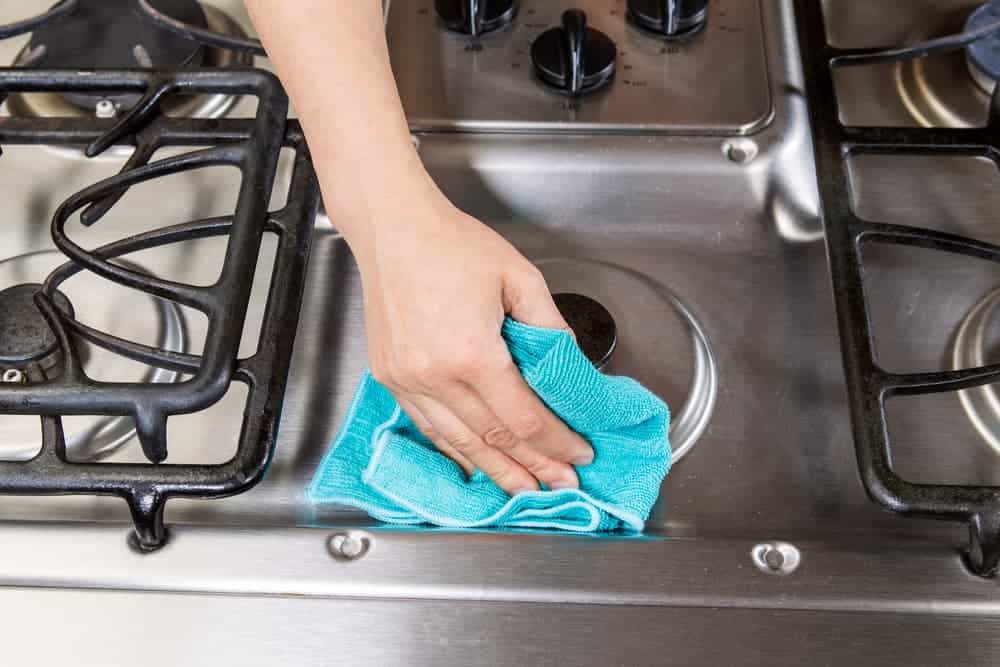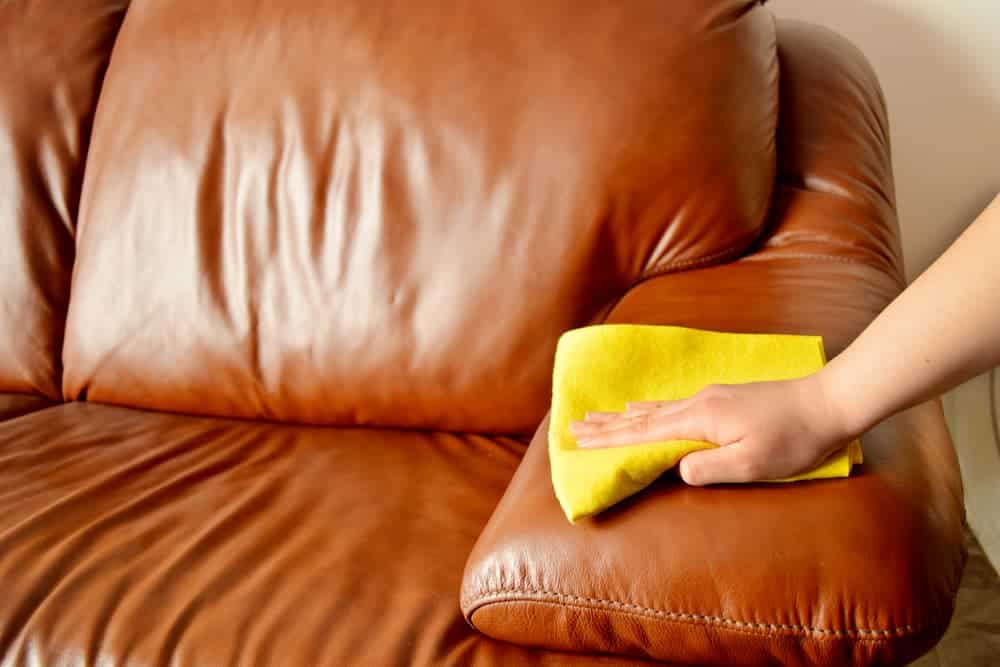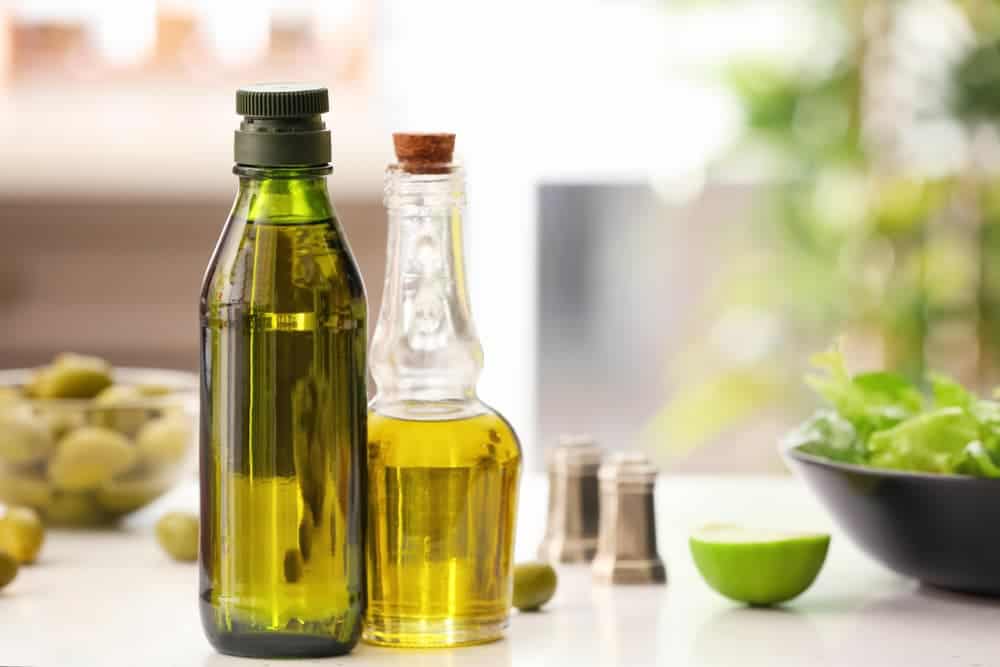There’s more to your EVOO than delicious stir-fries or sautés. This heart-friendly staple is also your quick-fix to many home problems like dull steel cookware or weathered wood cabinets. With so many benefits of olive oil, you’ll never look at its fancy bottle the same way again!
1. Cleans Cast Iron Pans
Do you love cooking with cast iron skillets or Dutch ovens? They’re a joy to use, especially when camping. But, at times, they can be a drag to clean and maintain. If you got food bits stuck on your beloved cast iron, forget about scrubbing it with soap. Use salt and olive oil instead.
Start by sprinkling some coarse salt onto your still-warm pan. Use a folded paper or kitchen towel to scrub the food gunk away. Discard the salt, rinse your pan in hot water, then wipe it dry thoroughly (or you can heat it over medium heat).
Next, use a paper towel to rub olive oil onto the pan inside and out. Let the oiled pan bake in a 176C oven for an hour, remove it to cool, then rub more oil to buff. Voila! Now you have a trusty seasoned pan for years of camping meals to come.
2. Makes Stainless Steel Shine
One of the many benefits of olive oil is it can make stainless steel or brass surfaces shine. And we know we have a lot of these at home, from kitchen appliances to pots to cutlery. Here’s how you can make them all sparkly again with this all-natural polish:
- Stainless-steel pots and pans. Spray your pan with vinegar, then wipe with a clean cloth to remove grimy marks. Next, put a few drops of olive oil onto a cloth or paper towel, and rub it onto the pan in a circular motion. Afterwards, buff it with a soft cloth. These additional tips should help keep your stainless-steel cookware looking new.
- Stainless-steel stovetop and appliances. Put a small dab of olive oil onto a rag, then use it to wipe smudges away from the microwave exterior, vent hood or fridge.
- Stainless cutlery or silverware. Over time, these pieces can develop tarnished spots. But you can keep them polished longer by rubbing them with a small amount of oil after washing.

3. Conditions Wooden Items
The revitalising benefits of olive oil even extend up to the wooden cabinet where you are storing it! One way to do it is to combine a tablespoon of olive oil and ¼ teaspoon of white vinegar. Dab your cloth into the mixture, then rub it on wooden surfaces to bring back its lustrous finish.
It’s important to note that you cannot substitute your homemade polish with any other oil. Vegetable and virgin coconut oil, for example, can potentially damage wood surfaces. But if you don’t like using vinegar on your furniture, you can use fresh lemon instead. Mix two parts of olive oil with one part lemon juice, then use the same rubbing technique. Now, who needs commercial wooden furniture polish!
Oh, and did you know you can also protect your wooden kitchen tools with olive oil? After handwashing, rub a light coat of olive oil onto your wooden chopping board, salad bowl or spoon. Let the oil soak in for about 5 minutes before buffing with a soft cloth. This extra step can nourish the wood, prevent discolouration and cracking, and disguise scratch marks.
4. Prevents Rusting
Metal and water do not mix. And without a protective layer, rust can build up on metallic items. Why not use olive oil as your moisture repellent? For instance, you can apply it every few months to your gardening tools. It works on lawnmower blades as well. You can also drip some olive oil on your razor blades to prevent rusting.
Rust is also the main culprit for our squeaky doors. So, lubricate the hinges with a few drops of olive oil when this happens. Move the door back and forth to let the oil drip inside. Metal zippers on clothes can also get stuck due to moisture. Just grab a Q-tip or cotton swab, dip it in olive oil, then dab it on the zipper teeth. Now, you won’t have to wrestle with your favourite pair of jeans again!
5. Polishes All Things Leather
Worn-out leather furniture, shoes, jacket or baseball mitt? You can always revive them with store-bought leather cleaner. But if you have olive oil in the kitchen, all you need is a few drops onto a dry microfiber cloth.
Rub it gently on the leather surface in a circular motion, let the oil soak in for about 30 minutes, then buff with a clean cloth. In case you’re out of olive oil, other cold-pressed varieties like beeswax and nut oil can double as a natural leather polish, too.

6. Handles Sticky Situations
One of my favourite benefits of olive oil is its ability to make sticky things less sticky. Here are a few ways how its magic works:
- Stubborn labels. Stickers on food jars, wooden items and plastic containers can be hard to remove even after washing them. To lessen the work (and frustration!), soak the sticky part in olive oil, using a soft cloth or paper towel for dabbing. Let it sit for about 15 minutes before peeling the sticker off effortlessly.
- Stuck-on gum. If this somehow ended up on your hair or shoe, soak it with some olive oil for 10 minutes. The chewing gum will eventually break down and slide right off.
- Sticky ingredients. Honey and peanut butter can be hard to scoop out of measuring cups or spoons. What you can do is rub your measuring tool with a bit of olive oil before measuring. With this trick, no ingredient goes to waste, and clean-up is a breeze!
- Drippy candle wax. Are you still scraping wax out of your candle holders? Skip the mess and hard work by coating them with a bit of olive oil. The dried candle wax should peel off with ease.
- Paint splatters. Doing a paint job on your room or ceiling also means getting paint mist on your skin and hair. A little olive oil on a cotton wool pad and some gentle scrubbing should do the trick.
With all these additional benefits of olive oil, you’ll be using it more for sure. But did you know that there are other natural cleaning products you can use at home? Try these baking soda and vinegar cleaning tips next.


